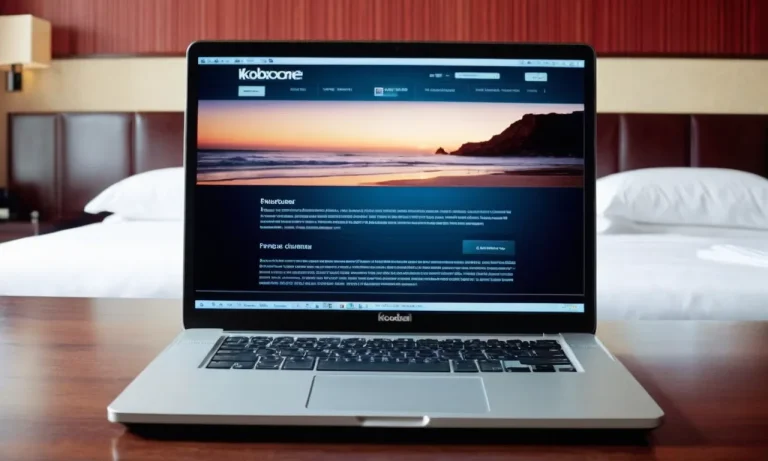Can I Book a Hotel for Someone Else? A Comprehensive Guide
Planning a trip for a loved one or arranging accommodations for a business associate? Booking a hotel for someone else can be a thoughtful gesture, but it also comes with its own set of challenges and considerations.
If you’re short on time, here’s a quick answer to your question: Yes, you can book a hotel for someone else, but there are certain steps and precautions you need to take to ensure a smooth and hassle-free experience.
In this comprehensive guide, we’ll explore the ins and outs of booking a hotel for someone else, covering everything from the legalities and payment methods to communication and special requests. Whether you’re planning a surprise getaway or arranging corporate travel, this article will equip you with the knowledge and tips you need to make the process seamless and stress-free.
Understanding the Legalities
Booking a hotel room for someone else can be a convenient option, but it’s crucial to understand the legal implications and potential risks involved. Hotels have specific policies and procedures in place to ensure the safety and security of their guests, and violating these rules can lead to complications or even legal consequences.
In this section, we’ll explore the legalities surrounding third-party bookings, identification requirements, and liability considerations.
Hotel Policies on Third-Party Bookings
Many hotels have policies that allow guests to book rooms for others, but there are often specific guidelines to follow. Some hotels may require the person making the reservation to provide the name and contact information of the intended guest(s).
Others may insist that the guest whose name is on the reservation must be present at check-in and present a valid form of identification. It’s essential to familiarize yourself with the hotel’s policies before attempting to book for someone else.
According to Hotels.com terms of service, if you’re making a booking for someone else, it’s important to get their permission first. Make sure to explain all the details of the booking, including any rules or restrictions, and make sure they’re okay with it all.
Remember, you’ll be the one responsible for paying for the booking, handling any changes or cancellations, and dealing with anything else that comes up related to it. Failure to comply with these policies could result in the reservation being canceled or additional fees being charged.

Verifying Identification Requirements
Hotels typically require guests to present a valid form of identification upon check-in, such as a driver’s license, passport, or government-issued ID. This is a standard practice to ensure the safety and security of all guests and to prevent fraudulent activities like identity theft or credit card fraud.
If you’re booking a room for someone else, it’s essential to inform them of the identification requirements and ensure they have the necessary documents ready.
Some hotels require that at check-in, guests must present a valid government-issued photo ID or passport. If a guest is unable to provide valid identification, the hotel may refuse to allow check-in. This policy helps hotels verify that the person checking in is the same person who made the reservation or is an authorized guest.
Liability and Responsibility Considerations
When booking a hotel room for someone else, it’s important to understand the potential liabilities and responsibilities involved. If the guest for whom you booked the room causes any damage or incurs additional charges during their stay, you may be held financially responsible as the person who made the reservation.
It’s crucial to communicate clearly with the intended guest about their obligations and responsibilities during their stay to avoid any misunderstandings or unexpected charges.
In most cases, the person who books the room is responsible for all charges incurred during the stay, including any damages or additional fees. This means that if you book a room for someone else and they cause damage or incur additional charges, the hotel may seek compensation from you as the person who made the reservation.
Payment Options for Booking a Hotel for Someone Else
Booking a hotel for someone else can be a thoughtful gesture, whether it’s for a family member, friend, or colleague. However, the process can be a bit tricky when it comes to payment options.
Don’t worry, though – we’ve got you covered with a comprehensive guide on the various payment methods available.
Using Your Credit Card
One of the most straightforward options is to use your own credit card to book the hotel. This method is convenient and widely accepted by most hotels and online booking platforms.
According to a Statista survey, the use of credit cards is one of the most used online payment in the US as of 2023. The benefits of using a credit card include earning rewards points, enhanced security, and the ability to dispute charges if necessary.
However, it’s important to note that some hotels may require the guest’s credit card upon check-in for incidentals or additional charges. In such cases, it’s a good idea to inform the hotel in advance that you’re booking for someone else and clarify their policies.

Prepaid Hotel Vouchers and Gift Cards
Another option is to purchase a prepaid hotel voucher or gift card. These can be bought from the hotel directly or through third-party websites like Hotel Gift or Klook. Prepaid vouchers and gift cards are a great way to give the recipient the flexibility to choose their preferred hotel and dates, while also setting a budget for their stay.
One advantage of using prepaid vouchers or gift cards is that you don’t need to worry about providing your credit card information to the recipient. However, it’s crucial to read the fine print and understand any expiration dates, blackout dates, or restrictions that may apply.
Third-Party Booking Platforms
Many popular third-party booking platforms, such as Expedia, Hotels.com, and Booking.com, offer the option to book a hotel for someone else. During the booking process, you’ll typically be asked to provide the guest’s name and contact information. This can be a convenient option, especially if you’re booking a hotel as part of a larger travel package.
One potential downside of using third-party platforms is that you may not have direct communication with the hotel regarding special requests or changes to the reservation. Additionally, some hotels may offer better rates or promotions when booking directly through their website.
No matter which payment option you choose, it’s always a good idea to communicate with the hotel or the recipient to ensure a smooth and enjoyable stay.
Don’t be afraid to ask questions or clarify any policies or restrictions that may apply. With a little bit of planning and preparation, booking a hotel for someone else can be a wonderful and thoughtful gesture.
Communicating with the Hotel and the Guest
When booking a hotel for someone else, effective communication is essential to ensure a smooth and hassle-free experience for all parties involved. Whether you’re booking accommodations for a loved one, a business colleague, or a group, keeping everyone in the loop can make a significant difference.
Here’s what you need to know about communicating with the hotel and the guest:
Providing Guest Information and Special Requests
Hotels typically require detailed guest information when booking a room for someone else. Be prepared to provide the full name, contact details (email and phone number), and any special requests or preferences of the person(s) you’re booking for.
This information helps the hotel staff personalize the experience and ensure that any specific needs, such as accessibility requirements or dietary restrictions, are met. Most travelers worldwide consider personalized service an important factor when choosing accommodation.
Sharing Booking Confirmation and Details
Once you’ve made the reservation, it’s crucial to share the booking confirmation and details with the guest(s). This information typically includes the hotel’s name, address, check-in and check-out dates, room type, and any additional services or amenities you’ve booked.
Providing this information well in advance allows the guest(s) to plan their travel accordingly and ensures they have all the necessary details to smoothly check in and enjoy their stay. 😊 You can also consider sharing the hotel’s website or online reviews to give them a better understanding of the property and its offerings.
Establishing a Point of Contact
When booking a hotel for someone else, it’s essential to establish a clear point of contact. This person should be responsible for coordinating with the hotel and the guest(s) throughout the booking process and during their stay.
The point of contact can be you, the person making the reservation, or someone designated by the guest(s). This individual should be available to address any questions, concerns, or special requests that may arise, ensuring a seamless experience for everyone involved. 👍
Additionally, it’s a good idea to provide the hotel with the contact information of the guest(s) and the designated point of contact. This way, the hotel staff can reach out directly if any issues or changes arise during the stay.
Effective communication can go a long way in resolving potential problems and ensuring a positive experience for the guest(s).

Special Considerations for Corporate and Group Bookings
Negotiating Corporate Rates and Discounts
When booking hotels for business trips, corporate events, or group travel, securing favorable rates and discounts can significantly reduce overall costs. Many hotels offer special corporate rates and packages tailored to the needs of businesses and organizations.
To take advantage of these offers, it’s crucial to negotiate effectively. Start by researching the hotel’s corporate rates and policies. Websites like CorporateRates.com and Egencia provide access to negotiated rates for companies.
Additionally, consider reaching out to the hotel’s sales or group reservations team directly. They may be able to provide better rates or package deals based on the size of your group or the frequency of your bookings.
During negotiations, be prepared to discuss details such as the number of rooms required, the length of stay, and any additional amenities or services needed. Hotels are often willing to offer discounts for larger groups or longer stays.
Managing Multiple Reservations and Rooming Lists
Coordinating hotel accommodations for corporate events, conventions, or large groups can be a daunting task, especially when managing multiple reservations and rooming lists. Fortunately, many hotels and online booking platforms offer specialized tools and services to streamline the process.
When booking for a group, request a dedicated group reservation or rooming list from the hotel. This centralized platform allows you to easily add, modify, or cancel individual reservations as needed. Some hotels even provide customized booking websites or portals for your group, making it easier for attendees to reserve their rooms directly.
Consider utilizing online booking tools like Cvent or GroupHousing, which simplify the process of managing large group reservations. These platforms offer features such as real-time room availability, automatic room assignment, and integrated payment options.
Coordinating with Travel Managers or Agencies
For larger corporations or organizations with frequent travel needs, it’s often beneficial to work with dedicated travel managers or agencies. These professionals can leverage their industry knowledge and relationships to secure the best rates and negotiate favorable terms on your behalf.
Travel managers and agencies have access to a wide range of hotel inventory and can often provide exclusive deals and discounts not available to individual travelers. They can also assist with coordinating complex travel arrangements, such as group bookings, transportation, and event planning.
When working with a travel manager or agency, be sure to provide clear details about your company’s travel policies, budget constraints, and any specific requirements or preferences.
This will allow them to tailor their recommendations and negotiations to best suit your needs. Companies that utilize travel management services can save up to 20% on overall travel costs. 🎉
Tips and Best Practices for a Smooth Experience
Double-Checking Details and Preferences
When booking a hotel for someone else, it’s crucial to double-check all the details and preferences to ensure a seamless experience. Communication is key! 🔑
Ask the person you’re booking for about their specific needs and preferences, such as room type, bed size, accessibility requirements, or any special requests. Don’t assume; clarify everything to avoid unpleasant surprises.
It’s also a great idea to confirm the check-in and check-out dates, as well as any additional services or packages they might be interested in.
For example, if they’re celebrating a special occasion, you could surprise them with a room upgrade or a bottle of wine upon arrival. A little thoughtfulness can go a long way! 😊

Allowing Flexibility for Changes or Cancellations
Life can be unpredictable, so it’s wise to book hotels with flexible policies that allow for changes or cancellations. Many hotels understand the importance of flexibility and have adapted their policies accordingly. Many travelers prefer hotels with flexible cancellation policies.
When booking for someone else, make sure to read the fine print and understand the hotel’s cancellation and modification policies. Some hotels may charge fees for changes or cancellations, so it’s essential to be aware of these potential costs.
Additionally, consider purchasing travel insurance, which can provide coverage for unexpected situations like flight cancellations or medical emergencies.
Providing Feedback and Reviews
After the stay, don’t forget to follow up with the person you booked for and ask for their feedback. Did they enjoy their experience? Were there any issues or areas for improvement? Leaving an honest review on reputable travel sites like Booking.com or Hotels.com can be incredibly valuable for future travelers.
Positive reviews can help promote the hotel and encourage others to book with confidence. On the other hand, constructive criticism can help the hotel identify areas for improvement and provide better service in the future. Your feedback can make a difference! 👏
Booking a hotel for someone else can be a thoughtful gesture, but it’s important to do it right. By double-checking details, allowing flexibility, and providing feedback, you can ensure a smooth and enjoyable experience for both you and the person you’re booking for. Happy travels! 🌍✈️
Conclusion
Booking a hotel for someone else can be a thoughtful and convenient gesture, but it requires careful planning and attention to detail. By understanding the legalities, payment options, communication channels, and special considerations, you can ensure a seamless and stress-free experience for both you and the guest.
Remember to double-check all details, communicate clearly with the hotel and the guest, and allow for flexibility in case any changes or cancellations are needed. With the right approach and preparation, you can make the process of booking a hotel for someone else a breeze, creating memorable experiences and fostering stronger relationships along the way.





